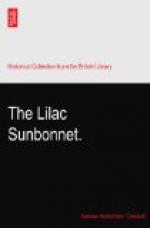“Weel, gin this news be true, there’s a heep o’ fowk in this parish should be mentioned in his wull,” said Jock Gordon, significantly. “They’re near kin till him—forby a heep o’ bairns that he has i’ the laich-side o’ the loch. They’re that hard there, they’ll no gie a puir body a meal o’ meat or the shelter o’ a barn.”
“But,” said Ebie Farrish, who had been thinking that, after all, the new plan might have its conveniences, “gin there’s nae deil to tempt, there’ll be nae deil to punish.”
But the herd was a staunch Marrow man. He was not led away by any human criticism, nor yet by the new theology.
“New Licht here, New Licht there,” he said; “I canna’ pairt wi’ ma deil. Na, na, that’s ower muckle to expect o’ a man o’ my age!”
Having thus defined his theological position, without a word more he threw his soft checked plaid of Galloway wool over his shoulders, and fell into the herd’s long swinging heather step, mounting the steep brae up to his cot on the hillside as easily as if he were walking along a level road.
There was a long silence; then a ringing sound, sudden and sharp, and Ebie Farrish fell inexplicably from the axe-chipped hag-clog, which he had rolled up to sit upon. Ebie had been wondering for more than an hour what would happen if he put his arm round Jess Kissock’s waist. He knew now.
Then, after a little Saunders Mowdiewort, who was not unmindful of his prearranged programme nor yet oblivious of the flight of time, saw the stars come out, he knew that if he were to make any progress, he must make haste; so he leaned over towards his sweetheart and whispered, “Meg, my lass, ye’re terrible bonny.”
“D’ye think ye are the first man that has telled me that, cuif?” said Meg, with point and emphasis.
Jock Forrest, the senior ploughman—a very quiet, sedate man with a seldom stirred but pretty wit, laughed a short laugh, as though he knew something about that. Again there was a silence, and as the night wind began to draw southward in cool gulps of air off the hills, Winsome Charteris’s window was softly closed.
“Hae ye nocht better than that to tell us, cuif?” said Meg, briskly, “nocht fresh-like?”
“Weel,” said Saunders Mowdiewort, groping round for a subject of general interest, his profession and his affection being alike debarred, “there’s that young Enbra’ lad that’s come till the manse. He’s a queer root, him.”
“What’s queer aboot him?” asked Meg, in a semi-belligerent manner. A young man who had burned his fingers for her mistress’s sake must not be lightly spoken of.
“Oh, nocht to his discredit ava, only Manse Bell heard him arguin’ wi’ the minister aboot the weemen-folk the day that he cam’. He canna’ bide them, she says.”
“He has but puir taste,” said Ebie Farrish; “a snod bit lass is the bonniest work o’ Natur’. Noo for mysel’—”
“D’ye want anither?” asked Jess, without apparent connection.




